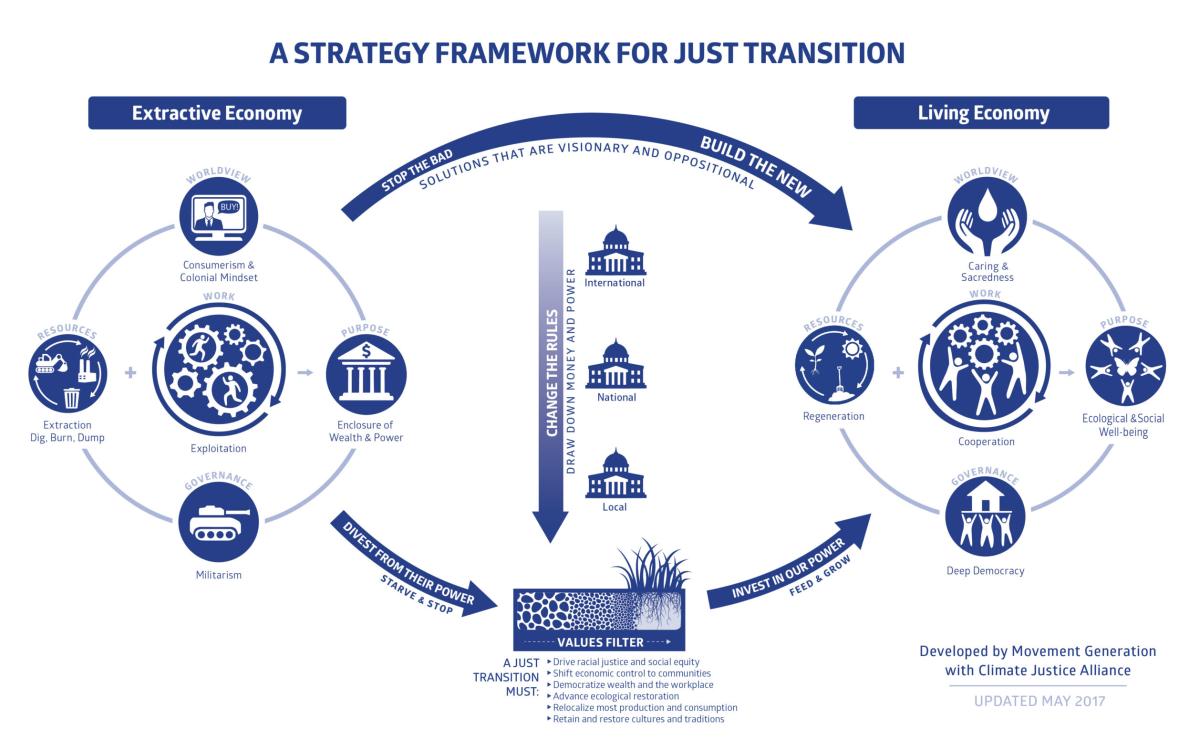The CSF’s work is informed by the Just Transition framework, a set of principles, processes, and practices that were first used during the labor movements of the 1970s. In response to the harmful consequences of extractive industries, workers from low-income communities of color organized. A Just Transition framework outlines a pathway from the current extractive economy to a regenerative economy by centering the building of social capital in historically marginalized communities. In this, people gain power and resources to influence the decisions that impact them.
Extractive Economy
An economy that is oriented around extracting resources from workers (labor) and Mother Earth (land, minerals, fossil fuels), creating omnipresent scarcity. The goal is to create wealth for society’s elite (Movement Generation, 2017).
Regenerative Economy
An economy that is oriented around taking resources as needed and replenishing those removed to generate abundance (Movement Generation, 2017).
False Solutions
Solutions that appear to solve the problem, but still exist within the extractive economy. For example, in the United States there is the problem of too many single-occupancy cars on the road that emit carbon into our atmosphere. Electric vehicles have been promoted as a green solution. However, this only focuses on one aspect of the problem (eliminating carbon emissions) and in the partial solution, simply switches extracting one non-renewable resource (gasoline) in favor of another non-renewable resource (e.g., cobalt and lithium). It is not sustainable and it is harmful to communities holding these resources. Learn more about the impacts of the "clean energy" movement on communities in Chile, Argentina, Bolivia, and the Democratic Republic of the Congo through CSF's Climate Justice Teach-In.
A solution that addresses both components of the problem would be increasing mass transit and electrifying those. This promotes community resources, reciprocal relationships, and shared goods, working towards a regenerative economy. It is important to learn how to identify false solutions so we can advocate for real solutions that are capable of creating a sustainable future. Learn more about applying a critical, justice-centered lens to climate solutions in the CSF hosted curriculum under "community learning."
Just Transition Deep Dive
- Just Transition Definition Guide
- The Ultimate Just Transition Slide Deck (covers three key parts with bonus slides for added learning.
- P1: Origins of the Just Transition and the extractive economy
- P2: The extractive economy's impacts and how we shift to a regenerative economy
- P3: How the CSF is leading a Just Transition on the UW-Seattle Campus).
- Short version Slide Deck (a condensed version on the very basics of the Just Transition Model pillars and how to read it)
- Short version Video (14 min run time on the Origins of JT and basics of model, pairs with slide deck)
HuES Intersectional Sustainability: A Lesson on False Solutions (October 24, 2024)
- Slides (includes a reflection on personal identity x sustainability, adding "identifying false solutions" to our toolkit, applied learning to the Makah tribe case study, how to create justice-centered climate solutions, offering a question guide, and further learning with CSF resources).
- Question Guide on Identifying False Solutions (quick 2 pager that includes how to identify false solutions, how to create justice-centered solutions, and traps to look out for!)
- All related resources (includes Makah case study)
Climate Justice Teach-In: Exploring a Just Transition Framework and Collective Action in Washington State (February 28, 2024)
Slides (includes an overview of the Just Transition Framework, Washington Policy Landscape [CCA, HEAL Act, IRA], UW-Seattle decarbonization examples, thinking beyond decarbonization [false solutions], and concrete actions for engagement).
Resource guide (includes readings on Lithium Mining, cobalt extraction in the Congo, hydroelectric dam impacts on salmon runs, environmental policy in King County and Washington State, EJ websites, climate justice tools, and other resource guides).
Rainer Ave Radio, Earth Deserves More Than a Day (April 21, 2025)
AASHE 2024, Storytelling as Reclamation: Establishing a Justice-Centered Sustainability Narrative (October 27, 2024)
Coming soon...
